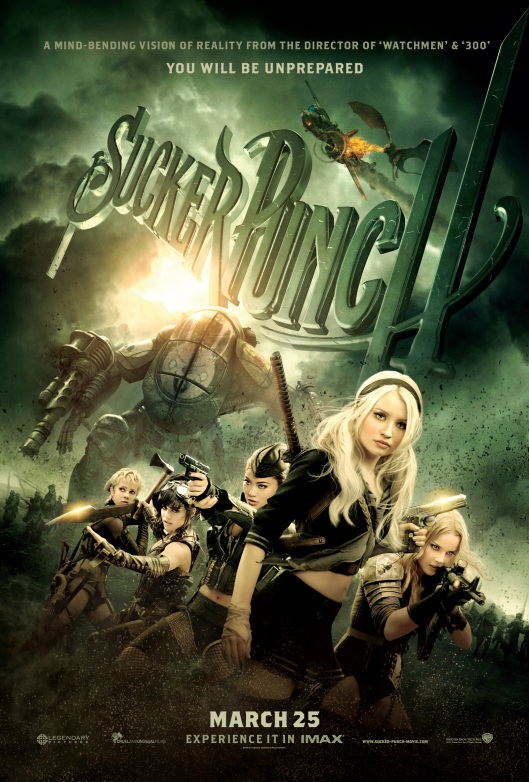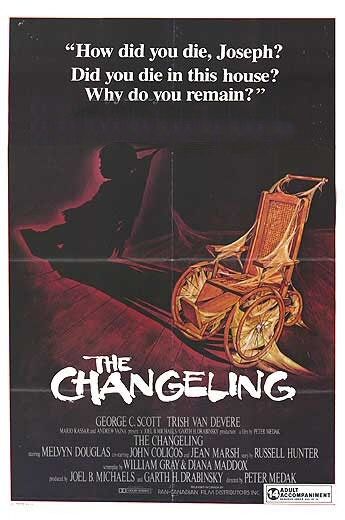In the hours leading up All Hallow’s Even, I have a few recommendations for anyone looking to curl up with a truly frightening film tomorrow night. In no particular order, here we have two really scary recent films to keep you up all night …
Sucker Punch (Zack Snyder, 2010): What is most horrifying about this film is the what it suggests about the utter bankruptcy of a postmodern imagination rooted in reference and remix rather than in telling stories. Zack Snyder’s slickly pretty parable about a nubile young woman, Babydoll (a hyper-sexualised Emily Browning), who creates elaborate fantasy worlds to escape the appalling conditions of the 1960s-era mental hospital in which she is imprisoned is truly chilling, though it was intended to be a story of the empowering potential of the imagination. The film unintentionally pulls back the curtain on the hollowness of genre filmmaking uncoupled from any sense of history or any awareness of the real world of flesh-and-blood human beings. 
Snyder, a visual stylist of the first order, has repeatedly shown in his adaptations of other people’s work that he can unearth the dark heart of a text but lacks either the talent or the intelligence (or both) to do anything with its subtext. In his solid, scary, but completely unnecessary remake of George A. Romero’s 1978 zombie horror masterpiece, Dawn of the Dead, Snyder evacuates the film’s setting, a suburban shopping mall, of all of its social criticism and its larger meaning. It becomes a backdrop for the film’s action, not part of its story. Romero made pointed criticisms of consumer capitalist culture by comparing the drooling hordes of zombies with shoppers in a mall, a sad, poignant, and utterly damning portrayal of normality as a world of the living dead. In his adaptation of Frank Miller’s 300, Synder captures all of Miller’s unfortunate fascistic tendencies but does nothing but make them live, breath, and bleed in visceral slow-motion. With Watchmen, adapted from Allan Moore and Dave Gibbons’ epoch-making alternative history comic book series (1986 -1987), Snyder faithfully captures and even amplifies the profound ugliness of Moore’s New York, but, unlike Moore (who has quite rightly disavowed the film), Snyder simply maroons us in this morass of grime and neo-noir pastiche. Moore turned the tale of ordinary people playing at superheroes into a potent and cutting critique of 1980s excess as the flipside of 1960s idealism. Synder just lets the ugliness speak for itself. Robbed of its context, not surprisingly, it has nothing to say.
Sucker Punch performs a similar trick, but this time it is even worse. Synder, working from his own script for the first time, gives us an utterly self-insulated and self-referential world; when Babydoll creates a series of elaborate fantasy worlds as a way to escape the very real horror of her situation, Synder is unable to give her anything to work with outside of noise and furious action (some of it, admittedly, staged quite beautifully). She imagines first a burlesque club as a stable first layer of fantasy and then a sequence of other, more fantastical secondary levels of disassociation, featuring giant samurai robots, zombie soldiers, dragons, and futuristic trains guarded by faceless automatons. In other words, the worlds that Babydoll creates in the 1960s are a pastiche of films, television shows, and comic books that she cannot have seen, given that they all appear on the cultural scene considerably later. What can we make of this? Is Snyder saying that all fan-boy culture is the creation of disturbed minds that create elaborate alternative worlds as a way of dealing with – or not dealing with – the cruel, senseless, and violent world outside the mind? It would be comforting to believe this, but, given that the film is itself masturbatory genre-fan pornography, a melding of the extreme sexualisation of young women in Japanese manga with the spectacle of contemporary fantasy film and the dense visual dazzle of big-budget science fiction cinema (though without any of the ideas that make films like Blade Runner, Children of Men, The Day the Earth Stood Still, and Sector 9 so memorable), it is difficult to give the film this much credit.
Synder’s world, then, is just another layer of unreality, and the audience is trapped in revolving worlds of noisy, hollow fantasy, just as Babydoll is. This is Debord’s nightmare of the spectacle taken to its horrific logical end. Worse than this, there is a moral hole at the very centre of Sucker Punch that is truly appalling, especially given that its director and many of its cast members have painted it as a feminist work. Most viewers do not have to escape from anything as bad as Babydoll does. In the film’s single scariest moment, Synder takes us into a filthy room with a solitary mattress on the floor and reveals the the hospital is witness to the serial rape of its young female inmates at the hands of a slovenly orderly. That Synder takes the silly, superficial Sucker Punch to levels of human depravity as dark and despicable as this is truly horrifying.
Margin Call (J. C. Chandor, 2011): This one is a bit unfair, I must admit, given that I am performing the lazy, reactionary critic’s move of writing about a film I’ve not actually seen (see almost any orthodox Christian critique of Martin Scorcese’s brilliant The Last Temptation of Christ for an example). I can only ask you to cut me some slack; I live in Dunedin, where mid-level films like this arrive rather later than for most, if we get to see them at the cinema at all. This criticism is not so much about the film, in any event, but the larger discursive structure that surrounds it. Judging by the beautifully-cut trailer for the financial thriller Margin Call, the true horror is that, faced with another in a long line of financial crises, we are still being sold the myth that such crises are surprising, that they are the work of a few unscrupulous people working dishonestly, that they are preventable. As the slovenly rockstar philosopher and recent al-Jazeera correspondent Slavoj Žižek writes in his incisive First as Tragedy, Then as Farce (London: Verso, 2009):
The only truly surprising thing about the 2008 financial meltdown is how easily the idea was accepted that its happening was an unpredictable surprise which hit the markets out of the blue. (p. 9)
For anyone in the know, this crisis, an inevitable result of a system that is based on exploitation and the faultiest of logic, was not a surprise. Its collapse is not the work of a few (though many of the people in charge are indeed rather despicable), but the result of attempting to create a necessary and infinite growth in a material and human field of finite resources. In short, the system fails because it has to, because it cannot not fail. That this mythology (and this is myth in the formal sense of the word as well as in its more commonplace pejorative sense) is still being repackaged and foisted upon as entertainment is something that will keep me up all night.
And now for two recommendations for those of you interested in actual horror films …
 The Changeling (Peter Medak, 1980): This film, which I first saw with my older brother when I was about twelve, still scares the pants off of me. The infinitely sad, haunting, and edge-of-your-seat tense story of a grieving widower (played by the great George C. Scott) who moves into a giant old house to try to put his life back together after the death of his family, this is one for those of you who think that the spooky séance scene cannot be scary after being done so many times. There are images in this film (the well, the well!) that can give me the chills just sitting here typing this.
The Changeling (Peter Medak, 1980): This film, which I first saw with my older brother when I was about twelve, still scares the pants off of me. The infinitely sad, haunting, and edge-of-your-seat tense story of a grieving widower (played by the great George C. Scott) who moves into a giant old house to try to put his life back together after the death of his family, this is one for those of you who think that the spooky séance scene cannot be scary after being done so many times. There are images in this film (the well, the well!) that can give me the chills just sitting here typing this.
Take Shelter (Jeff Nichols, 2011): After their quietly devastating collaboration on Shotgun Stories (2007), director Nichols and lead Michael Shannon (so good as a disturbed evangelical Christian in Boardwalk Empire) reunite for this chilling and infinitely unsettling story of a man haunted by visions of a coming apocalyptic storm. This one sets out to shake you and does it with infinite care and control rather than with jump-scares or people in silly masks. This is the psychological thriller as existential horror film, an interrogation of the idea of sanity in a world that is seemingly spiralling ever closer to irrevocable madness that is on par with Lars von Trier’s Melanchlia, which asks similar questions, though in a far more global and economic context (see more on that here) than Take Shelter‘s intimate portrait of the disintegration of a single Midwestern American family. The last fifteen seconds of Take Shelter are scarier and more deeply disquieting than any ten recent horror-classic remakes or anything in the thousands of pages of the Twilight Saga.
Sleep well, my friends …


